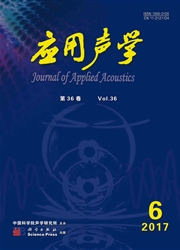

 中文摘要:
中文摘要:
针对海洋环境中真实目标常常被强干扰掩盖而难以检测与定位的问题,本文提出了一种基于特征分析的自适应干扰抑制(Eigenanalysis—based adaptive interference suppression,EAAIS)方法,并将其应用于水声目标被动测距。EAAIS方法预先确定目标方向在一个可能的角度范围内,根据接收数据互谱密度矩阵(Cross-spectral density matrix,CSDM)单个特征向量的波束形成,构造合适的判决因子来自适应地估计并去除CSDM特征空间中的非目标信号子空间以抑制干扰和噪声。然后利用修正后的CSDM进一步获得更清晰的目标的声场干涉条纹,通过匹配声强的频谱结构进行水声目标被动测距。海试数据处理结果验证了EAAIS方法在强干扰环境下有效实现抑制干扰和提高水声目标被动测距性能的能力。
 英文摘要:
英文摘要:
It is generally very difficult for passive sonar to detect and localize the weak sources in the presence of strong interferences. In this paper, an eigenanalysis-based adaptive interference suppression (EAAIS) method is proposed and applied to estimate the weak source's range. Assuming a prior knowledge of the bearing interval of the target of interest (TOI) was available, we first constructed a power ratio based on the beamforming of each eigenvector of the cross-spectral density matrix (CSDM) to adaptively identify and subtract the eigenvectors, which was not dominated by the TOI for interference suppression. The residual CSDM then was used to compute beam intensity striation for source range estimation. Sea experimental results show that the presented solution can provide more effective interference suppression and range estimates of the TOI.
 同期刊论文项目
同期刊论文项目
 同项目期刊论文
同项目期刊论文
 Analysis and comparison between two coupled-mode methods for acoustic propagation in range-dependent
Analysis and comparison between two coupled-mode methods for acoustic propagation in range-dependent 期刊信息
期刊信息
